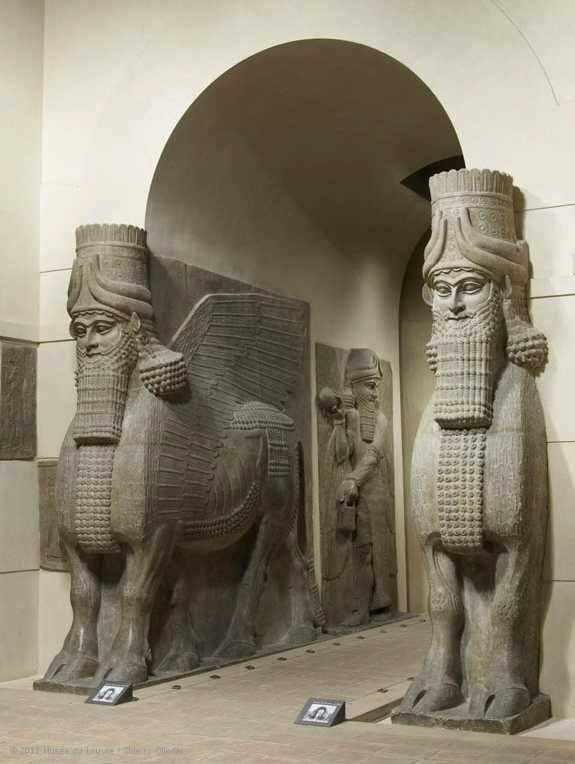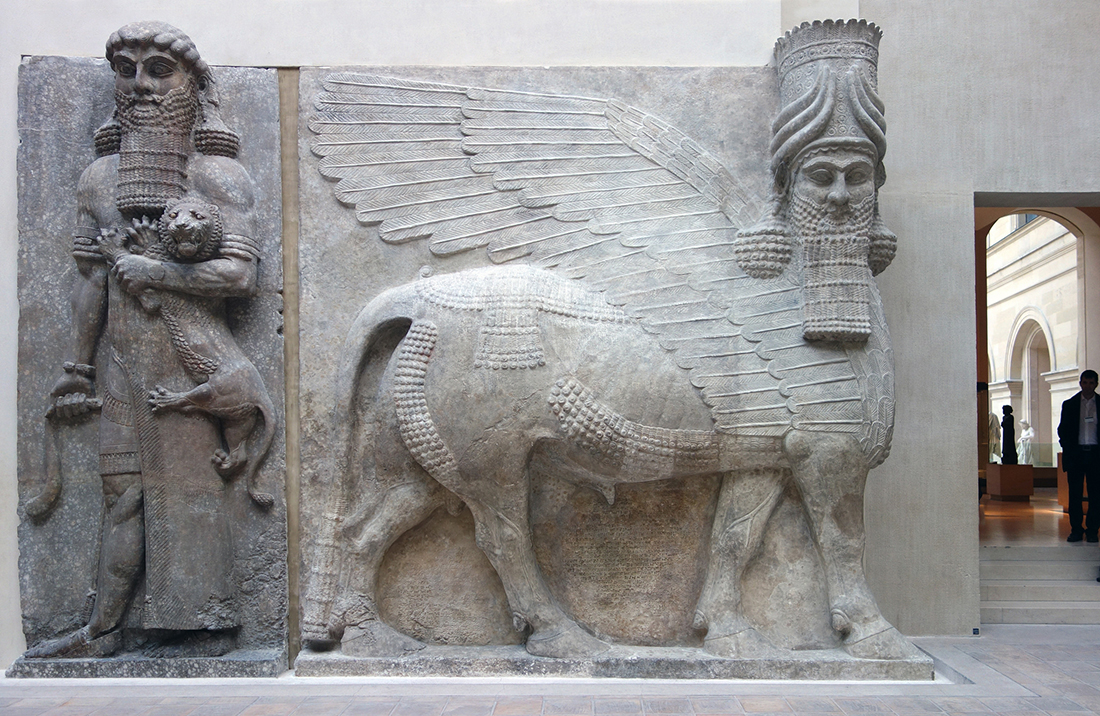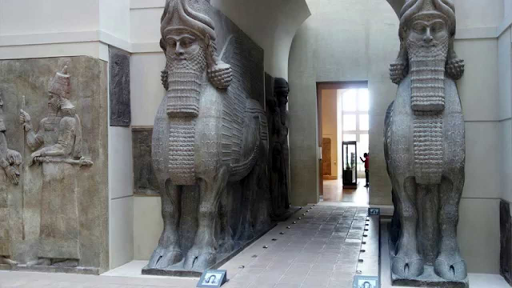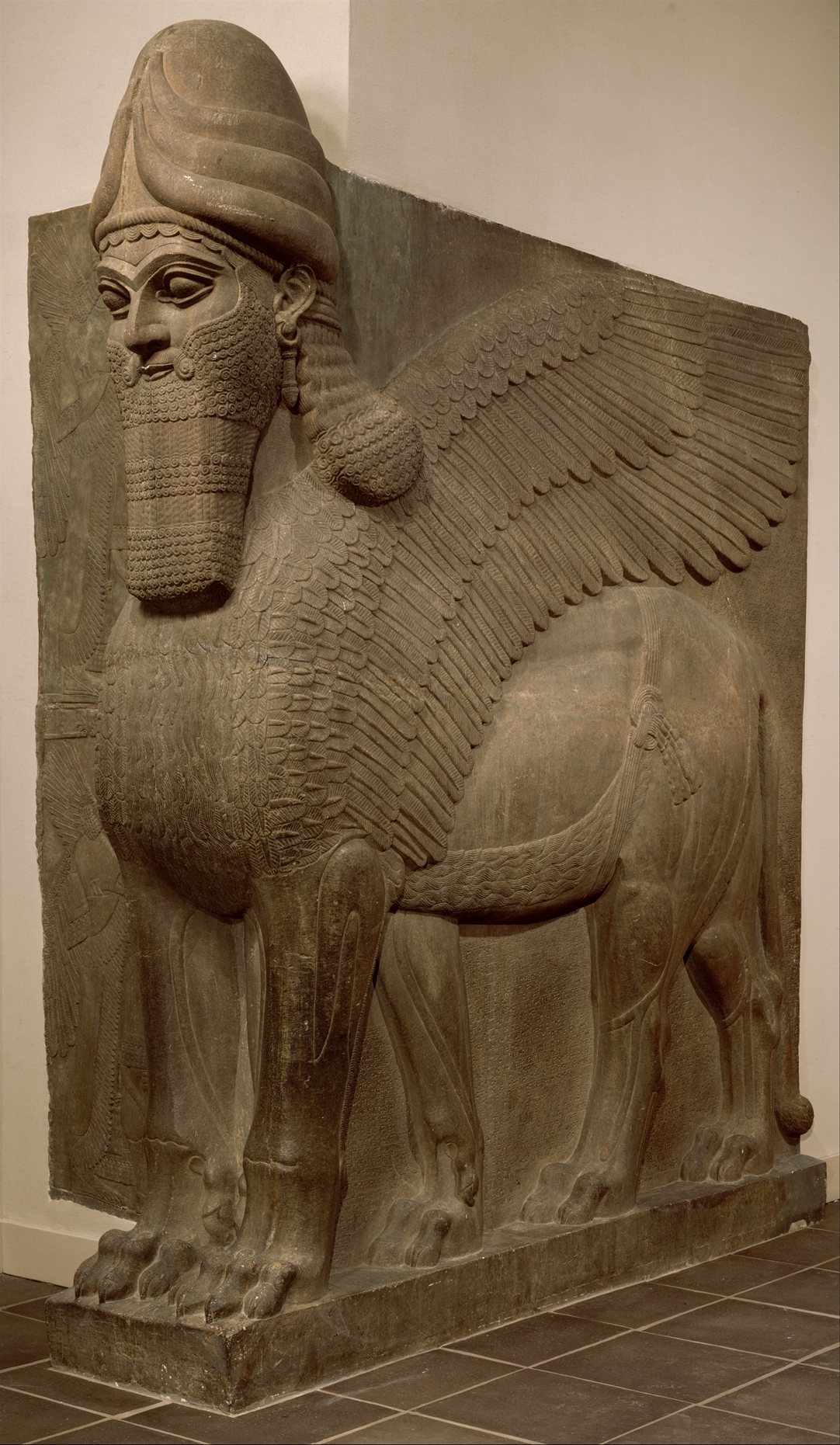It also symbolized as a sign of Assyrian power which was displayed to foreign dignitaries and ambassadors. Lamassu were placed on either side of the doorways of Assyrian palaces and of gateways to cities to protect against evil spirits and impress the neighbors.

Lamassu History 2701 Wiki Fandom
Originally unearthed in Rome and displayed in the Borghese Gallery it was sold to the occupying French and now sits in the Louvre.

. Lamassu Assyrian Throne Room Entrance Assyrian c. A Sargons palace b Gudeas Lagash c Ashurbanipals palace d Ziggurat at Ur Which of the following played an important role in the shaping of modern art. 720-705 BC Originally two opposite facing Lamassu stood on either side of the gate to the kings quarters.
A replica of Chicagos bull was made and displayed at. In the Assyrian mythology there were human headed winged bullslions that were protective genies. Click to see full answer.
883859 BC undertook a vast building program at Nimrud ancient Kalhu. However it is displayed in a museum in its original context a lamassu is the guardian of a doorway integral with a wall. Hermaphroditus was actually a popular subject of paintings and statuary even if Written By whitehouse March 11 2022 Add Comment Edit.
Where were the Lamassu sculptures originally displayed. First of all the figure has five legs. Looking up the lamassu that have been displayed in the.
Human-headed winged lion lamassu ca. 883-612 large monumental bulls often with wings and always with human heads were placed as gateway guardians at the entrances of royal palaces like Khorsabad and Nineveh. What were the most common themes in Assyrian art.
Indeed most of the sculptures were placed at gateways palaces underneath the houses and not in the temples. Lamassu were supernatural spirits sometimes called demons or genies depending on which language youre translating from who served to protect the gods as well as the important human structures. Furthermore where were the lamassu sculptures originally displayed.
The lamassu are human-headed winged lions or bulls therere many pairs of these sculptures that are still in existence including those in the British MuseumLondon LouvreParis and Metropolitan Museum of ArtNew York as well as several in Iraq. The lamassu in museums today including the Louvre shown in our video as well the British Museum The Metropolitan Museum of Art and National Museum of Iraq in Baghdad and others came from various ancient Assyrian sites located in modern-day Iraq. Chicagos bull seems to have been on display undisturbed since 1931.
The Lamassu sculptures were recovered from where. Where were the lamassu sculptures originally displayed. From the ninth to the seventh century BC the kings of Assyria ruled over a vast empire centered in northern Iraq.
The Assyrians envisioned a protective spirit that was part bull and part human and sometimes part eagle. The first change was the capital was moved to Dur Sharrukin present day Khorsabad and second the Lamassu was presented on a bulls body compared to a lions and seems to be slightly smiling. Which work has a king approaching the god.
This was possibly the first time when Europeans watched the mythical monsters. You can see them at Gate of All Nations at Persepolis in Iran the British Museum in London the Louvre in Paris the National Museum of Iraq in Baghdad the Metropolitan Museum of Art in New York and the University of Chicago Oriental Institute. The Assyrians came first.
On view at The Met Fifth Avenue in Gallery 401. What ethnic group is credited with the first system of writing known to man. They were represented as double-aspect figures on corners in high relief.
Assyrian sculpture typically placed prominent pairs of lamassu at entrances in palaces facing the street and also internal courtyards. There is no historical evidence showing that Lamassu was worshipped as a god. Currently representations of Lamassu are parts of collections at the British Museum in London Metropolitan Museum of Art in New York and The Oriental Institute in Chicago.
Babylonian protective demon with a bulls body eagles wings and a human head. For this reason it is not an entirely freestanding sculpture. The most famous colossal statues of Lamassu have been excavated at the sites of the Assyrian capitals established by King Assurnasirpal II reigned 883 859 BCE and King Sargon II reigned 721 705 BCE.
Strengthening these bonds further were the so-called Panhellenic sanctuaries and festivals that embraced all Greeks and encouraged interaction competition and exchange for example the Olympics which were held at the Panhellenic. The idea was to show the power of the king and intimidatedisplay the power of the Assyrians to those who entered. There are several fun facts about this sculpture.
Then in April 1991 Michael Bourbon master conservator from Paris arrived in Chicago to create a silicone and plaster cast of the lamassu. And the lamassu which were thought of as protective deities stood guard either side of an entrance way. Lamassu bull-man Lamassu.
Lamassu the were. The Ziggurat at Ur was a fortress funerary monument palace temple platform Where were the Lamassu sculptures originally displayed. The great Assyrian king Ashurnasirpal II r.

Lamassu From The Citadel Of Sargon Ii Video Khan Academy

Lamassu Backstory Article Assyrian Khan Academy

Human Headed Winged Lion Lamassu Assyrian Neo Assyrian The Metropolitan Museum Of Art
Colossal Lamassu Sculpture From The Palace Of Sargon Ii At Khorsabad Sargon Ii Google Arts Culture

Lamassus At The Louvre Thatmuse

25 Lamassu From The Citadel Of Sargon Ii Dur Sharrukin Modern Iraq Ap Art History
Human Headed Winged Bull Lamassu Assyrian Neo Assyrian The Metropolitan Museum Of Art

0 comments
Post a Comment